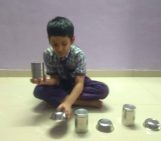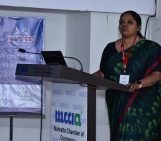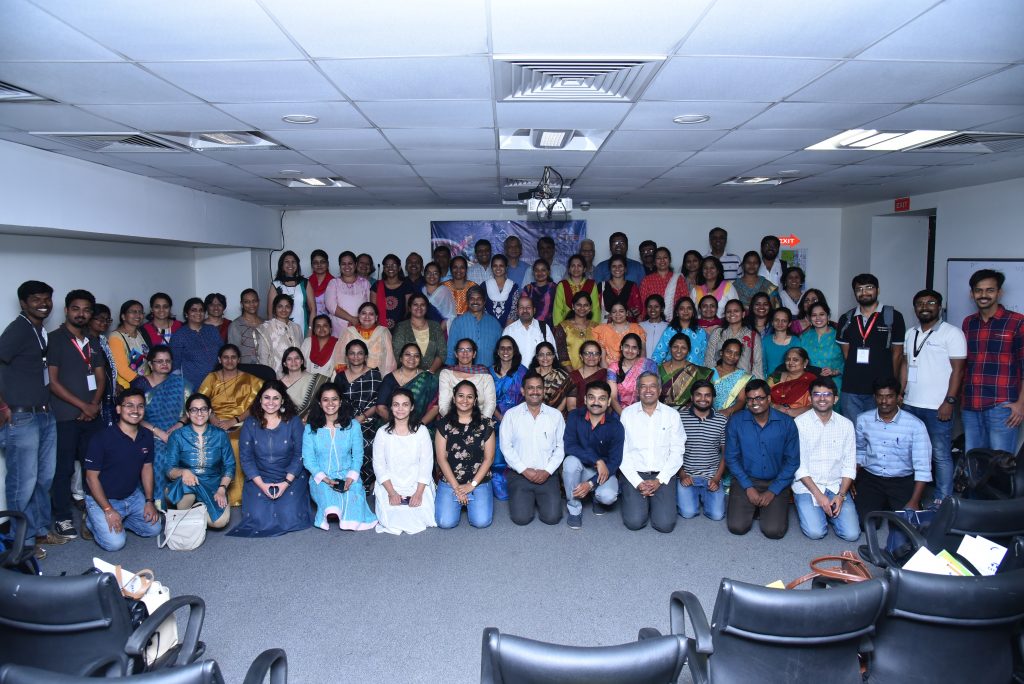 More than 140 delegates which included teachers, Principals and organisations working in the field of education from 20 cities and 7 states of the country attended CTiS2019 the 1st conference on Computational Thinking in schools which took place on 20th April 2019 at Pune. The conference was organized by CSpathshala (www.cspathshala.org), an ACM (Association for Computing Machinery) India initiative (india.acm.org) to provide a platform for educators to share their experiences, student learnings/stories, outcomes and interesting new experiments.
More than 140 delegates which included teachers, Principals and organisations working in the field of education from 20 cities and 7 states of the country attended CTiS2019 the 1st conference on Computational Thinking in schools which took place on 20th April 2019 at Pune. The conference was organized by CSpathshala (www.cspathshala.org), an ACM (Association for Computing Machinery) India initiative (india.acm.org) to provide a platform for educators to share their experiences, student learnings/stories, outcomes and interesting new experiments.
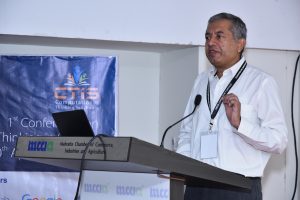 CSpathshala is a not for profit, initiative to bring a modern computing curriculum, emphasising on problem solving and computational thinking skills, to Indian schools. Vipul Shah, Head, CSpathshala initiative in his opening remarks said, “Computing is touching our lives in more ways than before and how do we prepare our students for this new world. A modest beginning with 15 pilot schools to 3 Lakh students in 750 schools across 11 states in three years, CSpathshala is increasingly becoming an enabler fostering a community of teachers volunteers and partners and engaging students through various programs.”
CSpathshala is a not for profit, initiative to bring a modern computing curriculum, emphasising on problem solving and computational thinking skills, to Indian schools. Vipul Shah, Head, CSpathshala initiative in his opening remarks said, “Computing is touching our lives in more ways than before and how do we prepare our students for this new world. A modest beginning with 15 pilot schools to 3 Lakh students in 750 schools across 11 states in three years, CSpathshala is increasingly becoming an enabler fostering a community of teachers volunteers and partners and engaging students through various programs.”
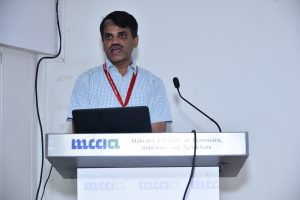
Prof. Venkatesh Raman, Program Chair, shared that, “CTiS2019 makes a beginning with inviting participation from teachers implementing CSpathshala curriculum. We had received 55 abstracts and all abstracts showed, in general a highly positive feedback on the curriculum. Of the 55 abstracts, 9 were selected for presentation based on some specific examples and experiences and the chairs invited two other presentations.”
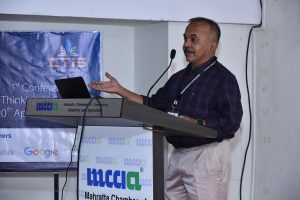
Arun Kadekodi, Organising Committee, said, “CTiS2019 had over 150 registrations from teachers, principals and organisations working in the field of education from 7 states across the country.” Arun also thanked the invitees, the Program and the Organising committee and the sponsors for their support. The conference sponsors included Cambridge University Press, Google, ACM-India and Sakal Social Foundation.
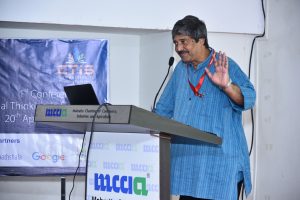
Prof. R Ramanujam from the Institute of Mathematical Sciences, Chennai, the keynote speaker said, “There is a need to move away from silent classrooms and encourage students to graduate from finding the answer to question how we know the answer. All this can not happen without children talking, discussing and arguing. There is a need to shift from content to process. A range of processes are needed in the classroom which include visualization, estimation and approximation, abstraction and generalization, representation, use of patterns, use of heuristics, making connections, formal communication and argumentation.”
CTiS2019 featured presentations by teachers from across the country on how schools are integrating CT activities with physical computing and mathematics.
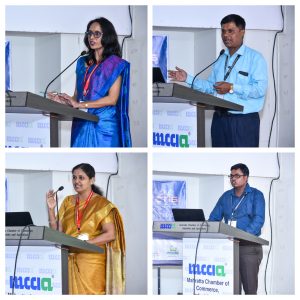 Anantha Narayanan from Amrita University, Coimbatore demonstrated the devices they have built based on open source software and inexpensive hardware, to inculcate interest in students to gain hands-on experience with circuits and boards. He also offered to help schools set up Atal TInkering labs. Manisha Girolkar shared how Kalmadi School has set up the Atal Tinkering Lab which provides students an opportunity to innovate and bring their ideas into reality. She demonstrated projects like noise indicator, bus-o-bot etc. that her students had worked on. Special presentations on implementation models by Geeta Ghormade from Meghe Group of Schools and by Ramesh on the 425 Andhra Pradesh Social Welfare schools provided insights on the structured implementation of Computational Thinking curriculum across urban and rural schools.
Anantha Narayanan from Amrita University, Coimbatore demonstrated the devices they have built based on open source software and inexpensive hardware, to inculcate interest in students to gain hands-on experience with circuits and boards. He also offered to help schools set up Atal TInkering labs. Manisha Girolkar shared how Kalmadi School has set up the Atal Tinkering Lab which provides students an opportunity to innovate and bring their ideas into reality. She demonstrated projects like noise indicator, bus-o-bot etc. that her students had worked on. Special presentations on implementation models by Geeta Ghormade from Meghe Group of Schools and by Ramesh on the 425 Andhra Pradesh Social Welfare schools provided insights on the structured implementation of Computational Thinking curriculum across urban and rural schools.
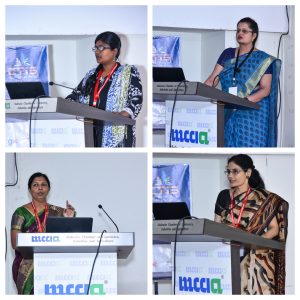 Teachers showcased how Sudoku could be taught with fruits instead of numbers, how paths in graphs can be used to find shorter routes to visit Manache ganpati in Pune, how following instructions can be taught by playing a Robot game, how algorithms can be used to minimize search space when guessing birth-dates, and how floor space can be effectively used to engage and train students on recognizing patterns.Computing for all had presentations on use of Computational Thinking activities for the differently abled students.
Teachers showcased how Sudoku could be taught with fruits instead of numbers, how paths in graphs can be used to find shorter routes to visit Manache ganpati in Pune, how following instructions can be taught by playing a Robot game, how algorithms can be used to minimize search space when guessing birth-dates, and how floor space can be effectively used to engage and train students on recognizing patterns.Computing for all had presentations on use of Computational Thinking activities for the differently abled students.
Divy Thakker from Google India also spoke on CS First an initiative to teach programming to students. The event overall demonstrated that computing goes beyond the simple ability to use computers, and can be taught and discussed in schools without the use of computers.
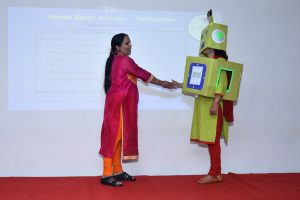 A.Surendra, state coordinator, Andhra Pradesh Department of Social Welfare, shared that CTiS provided an opportunity to teachers to share and learn about the CT implementation from different schools from states across the country. Santosh Hande, Zilla Parishad School, Khed shared that, “CTiS provided a platform for the Zilla Parishad teachers to share their experiences in implementing CT activities with other schools.” Asmita Mulay, Maths Teacher from School Of Scholars, Amravati said “CSpathshala is the way to provide a innovation in studies with fantastic worksheets.” Pratiksha Majumdar, Meghe Group of Schools, Nagpur said that “CTiS is the only platform for school computer teachers to interact with other computer teachers.”
A.Surendra, state coordinator, Andhra Pradesh Department of Social Welfare, shared that CTiS provided an opportunity to teachers to share and learn about the CT implementation from different schools from states across the country. Santosh Hande, Zilla Parishad School, Khed shared that, “CTiS provided a platform for the Zilla Parishad teachers to share their experiences in implementing CT activities with other schools.” Asmita Mulay, Maths Teacher from School Of Scholars, Amravati said “CSpathshala is the way to provide a innovation in studies with fantastic worksheets.” Pratiksha Majumdar, Meghe Group of Schools, Nagpur said that “CTiS is the only platform for school computer teachers to interact with other computer teachers.”
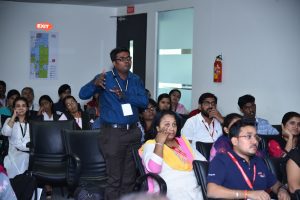 During the feedback session conducted by Prof. Venkatesh Raman all the participants agreed that CTiS provides a platform for sharing experiences and learning from each other. Discussions on the format for CTiS for 1 or 2 days, led to a majority agreeing to 1 day. They shared suggestions on regional/school level events like they have for Science where students can exhibit what they have learnt. Vipul Shah suggested have an annual Computational Thinking Day/Week so that schools could organise various events/competitions during this week across the country.
During the feedback session conducted by Prof. Venkatesh Raman all the participants agreed that CTiS provides a platform for sharing experiences and learning from each other. Discussions on the format for CTiS for 1 or 2 days, led to a majority agreeing to 1 day. They shared suggestions on regional/school level events like they have for Science where students can exhibit what they have learnt. Vipul Shah suggested have an annual Computational Thinking Day/Week so that schools could organise various events/competitions during this week across the country.
In her closing remarks Sonia Garcha shared that Sharing is Learning and CSpathshala has been working towards creating a Community of Practice that provides a platform for educators to contribute, share experiences and resources as well as learn from each other and organising the CTiS2019 conference is part of this larger process!

